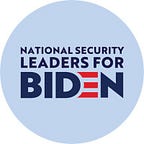A Crisis of National Insecurity
By Brig. Gen. Joseph V. Medina, USMC (Ret.)
During three decades serving in the United States Marine Corps, I helped ensure national security. Now, as I watch that security deteriorate, I’m sounding the alarm for my local community. Decisions made in Washington are putting our national security in jeopardy — and that should worry us here in Texas. To me, national security includes:
● Supporting troops with a defense budget that prioritizes their safety and needs in the line of fire
● Smart and stable diplomacy to make conflict a last resort
● And emergency readiness and preparation for unforeseen events within our own borders as divergent as hurricanes and pandemics
For Texans, our 1,200-mile border with Mexico is our most visible national security vulnerability, and we are all familiar with the arguments, pro and con, for a border wall. What you might be less familiar with are the decisions made in Washington to fund that border wall.
According to Military Times, the border wall construction has diverted billions from other parts of the defense budget. The funds were taken from accounts used to fight the drug war, to improve military training facilities and on-base schools, and to provide relief for the Puerto Rico National Guard in the wake of Hurricane Maria. Even more troubling, money was diverted from projects in Europe essential to countering Russian aggression.
Those projects abroad might seem less urgent than the border so close to us, but they represent the work and wisdom of career national security officials like myself. We understand the importance of the US relationship with our European allies, and the balance of power it guarantees. It’s the reason we have been spared a global conflict since the summer of 1945, 75 years ago.
As someone who put my life in danger to defend this country, I value those alliances and the work to maintain them. The Trump administration has different priorities: For four years now, the president has proposed deep cuts in foreign aid, by nearly one-quarter in 2020. Fellow former military commanders have spoken out about what this means:
“Diplomacy and development are essential to combating threats before they reach our shores,” more than a dozen former combatant commanders said in a statement last March. “We stand with and share the perspectives of our fellow combatant commanders who have testified … on the strategic importance of the State Department, USAID, and other US development agencies as key partners around the world.”
The administration’s tone has reflected this disregard for diplomacy. In recent years, the United States has publicly chastised and offended our allies, both in Europe and in Asia. We have made unilateral decisions to withdraw troops, flouting long-term agreements with allies. But, as one Republican senator pointed out, the United States does not choose arbitrary locations for its bases: troop deployments are planned to enhance America’s national security interest. “The President’s lack of strategic understanding of this issue increases our response time and hinders the important deterrent work our servicemen and women are doing.”
Before we can fight abroad, national security means readiness at home. In Texas, we were not prepared for more than 800,000 COVID-19 cases, which resulted in more than 16,000 deaths and growing. Shortsighted decisions in Washington allowed this pandemic to spread out of control. For example, in 2018, the National Security Council’s Global Health Security and Biodefense unit was disbanded. Although explained away as a minor reorganization, this eliminated a major “pandemic trip alarm” at the most senior level.
We in Houston are familiar with FEMA, which came to our aid after Hurricane Harvey. We have less experience with FEMA’s preparation for pandemics. Under the current administration, the Department of Homeland Security, where FEMA resides, had other priorities. According to the Wall Street Journal, this means programs to model and stockpile supplies for the type of disaster we are now facing were put on the back-burner. Rather than reinforcing our national security, this lack of preparation has left us vulnerable and distracted from longer-term threats.
My career has taught me that national security takes hard work, expertise, and humility. For that reason, I joined with 488 other retired national security leaders to back Joe Biden. We hope that over the next four years our military, our diplomats, and our nation can regain lost ground.
During three decades of military service, Brigadier General Joseph V. Medina, USMC (Ret.), commanded organizations in the United States, Europe, and Asia, retiring as commander of the 3rd Marine Expeditionary Brigade and Deputy Commanding General of 3rd Marine Expeditionary Force on Okinawa, Japan. He is currently CEO of the Asia Pacific Strategies and Solutions Group (APSS) and resides in the Houston area.
